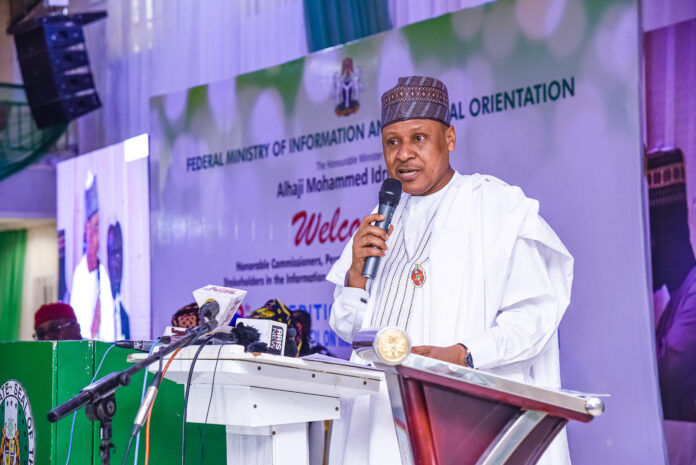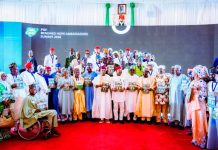SPEECH BY THE HONOURABLE MINISTER OF INFORMATION AND NATIONAL ORIENTATION, MOHAMMED IDRIS (fnipr) AT THE 48TH NATIONAL COUNCIL OF INFORMATION AND NATIONAL ORIENTATION, HELD IN KADUNA ON FRIDAY, 13TH DECEMBER, 2024.
Protocol.
It is, indeed, a great honor to address you today at this 48th National Council of Information and National Orientation #48thNCINO, convened here in the vibrant and historic city of Kaduna. Let me start by expressing my profound gratitude to His Excellency, Mallam Uba Sani, the Executive Governor of Kaduna State for the warm hospitality and unwavering support extended to all participants. This is a testament to Kaduna State’s pivotal role as a beacon of progress and inclusion in our national development journey. On behalf of all participants, therefore, I want to say we are delighted to congregate in the “Centre of Knowledge.”
The theme of this year’s Council meeting, “Enhancing Public Information Management for Inclusive Governance: The Renewed Hope Agenda in Focus,” could not have been more appropriate. It underscores the critical role of public information in bridging the gap between government policies and the aspirations of the Nigerian people, a role that is at the very heart of President Bola Ahmed Tinubu’s Renewed Hope Agenda.
The essence of governance lies in its ability to connect, communicate, and inspire collective action. In this regard, information management is not merely a tool of administration but the lifeblood of democracy and development. I commend all stakeholders here today for their commitment to advancing this important cause.
Nigeria’s unique diversity is both a source of strength and a challenge. With a multiplicity of ethnic groups, languages, and religions, ensuring that every citizen feels heard, informed, and included in the governance process, requires deliberate efforts, especially by Information Managers.
The Renewed Hope Agenda of President Bola Ahmed Tinubu (GCFR) is a clarion call for transformational leadership at all levels and people-oriented governance. The Agenda is firmly anchored on the time-honoured principle that governance must be inclusive, transparent, and centered on improving the lives of Nigerians.
Our responsibility, as custodians of information dissemination, is to ensure that the policies and programmes of both the national and subnational governments reach every Nigerian, regardless of location, language, or social status. We must promote a two-way communication channel: informing the public of government initiatives while listening to their feedback to refine governance practices.
At the Federal Ministry of Information and National Orientation, we have crafted five (5) guiding pillars for our mission, as follows:
Pillar 1 is restoring trust, confidence and credibility to public communications, by engaging in a timely, proactive and consistent fashion with all our stakeholders,
Pillar 2, closely tied to Pillar 1, is amplifying the policies, programs and achievements of the President Bola Ahmed Tinubu-led Administration, and the positive impact of these policies and programs in the lives of the Nigerian people.
Pillar 3 is reorienting national values, attitudes and ethics in Nigeria by implementing a series of targeted and effective national campaigns, centralized in the new National Values Charter.
Pillar 4 is modernizing and upgrading the Federal Government’s Information and Communications Systems and Personnel, ensuring they are relevant and fit-for-purpose for the 21st century.
Pillar 5 is creating an enabling environment for all players and stakeholders in the media and information ecosystem: journalists, publishers, proprietors, etc.; through the implementation of favorable policies and incentives.
Guided by these pillars, we are working with determination to support the achievement of the ambitious goals of the Renewed Hope Agenda.
This now leads me to four critical areas that we must collectively focus on as information managers of the Federal and State Governments, as we approach a new year.
One. Adopting Technology: Today, Digital tools are at the core of transforming the global communication landscape. We must leverage technology to enhance the speed, accuracy, and reach of our messaging. This includes upgrading the capacity of government communication platforms and integrating artificial intelligence for better audience engagement and feedback analysis.
Two. Engendering Public Debate for Policy Refinement and Alignment with Public Aspirations: In every democracy, the strength of governance is deeply rooted in its ability to reflect the will and aspirations of the people. Public policies, while crafted with the best intentions, must continuously evolve to meet the dynamic needs and expectations of the citizens they serve. It is within this context that public debate plays a pivotal role.
For instance, you are all aware that we are currently witnessing robust debates on the Tax Reforms proposed by President Tinubu. Such debates are necessary in policy formulation and implementation in order to foster a transparent exchange of ideas, where citizens, civil society organizations, and other stakeholders can voice their opinions, and provide constructive feedback on the reform proposal of the President.
Three. Strengthening Grassroots Communication: Information management must transcend urban centres to reach the remotest communities. Local languages, town hall meetings, and community radio stations should play pivotal roles in ensuring inclusivity.
To this end, and in recognition of the diverse nature of our country, the Federal Ministry of Information and National Orientation, through the Federal Information Centres (FICs) has prioritized grassroots engagement through town hall meetings, community outreach programmes, and collaboration with local stakeholders, to ensure that government policies resonate with citizens at all levels.
Four. Countering Misinformation and Fake News: In an era of rapid information exchange, fake news poses a significant threat to governance and public trust. We must provide the necessary skills for our officers to employ fact-checking mechanisms, as well as seek collaboration with media organizations, and enhance public awareness campaigns to combat misinformation.
Your Excellency, distinguished participants,
I am delighted to inform this eminent gathering that President Bola Ahmed Tinubu, has recently approved the release of funds for the immediate operationalization of the Category-2 Media and Information Literacy (MIL) Institute, whose hosting rights were awarded to Nigeria by the United Nations Educational, Scientific and Cultural Organisation (UNESCO).
At its core, the UNESCO Media and Information Literacy Institute (MIL) in Nigeria, the first of its kind in the world, and embedded in the precincts of the National Open University of Nigeria (NOUN) in Abuja, will equip people with the tools to discern between credible sources and misinformation.
In an era where fake news, propaganda, and biased reporting can significantly influence public opinion and decision-making, media literacy fosters critical thinking. It helps individuals analyze the intent behind media messages, understand the context in which they are presented, and assess their accuracy and relevance.
I will therefore urge the Commissioners for Information to take advantage of this very important Institute once it takes off, in order to further build the capacity of our staff in combating the menace of fake news, misinformation, and disinformation.
Promoting National Orientation: As we enhance information management, it is vital that our messaging goes beyond conveying facts and figures to promote the inculcation of values and morals in our citizens.
By this I mean that Information is not just a tool for communication; it is a powerful medium for shaping societal behaviour, attitudes, and beliefs. By embedding messages that promote integrity, responsibility, patriotism, and respect for constituted authority and others, we can inspire a culture of ethical conduct and civic responsibility.
Your Excellency, distinguished participants, ladies and gentlemen,
At this juncture, I would want to make a passionate appeal to some of our state governments, especially on the status and operations of State Ministries of Information.
And my plea, for emphasis, goes like this: that, in the ever-broadening parameters of governance, the role of Ministries of Information at both the national and state levels cannot be overstated. These Ministries serve as the bridge between government policies and the citizens they are designed to benefit, thereby fostering transparency, accountability, and trust, which are essential pillars of any thriving democracy.
The Ministry of Information plays a critical role in public sensitization. Through this institution, and the platforms associated with it, governments are able to educate citizens on policies, programmes, and initiatives. They also serve as vital platforms for addressing misinformation, which, if left unchecked, can erode public trust and undermine collective progress. In an era where information is both a tool and a weapon, having a dedicated body to manage its dissemination is indispensable.
As we deepen our democratic processes and strive for national development, the existence of Ministries of Information, particularly at state levels, remains a necessity. They are not just administrative bodies but key drivers of public engagement, national orientation, and societal cohesion.
I will therefore urge state governments considering the dissolution or downgrading of their Ministries of Information to reconsider this decision. These institutions, in most cases the custodians of our cultural and historical repertoire, need to be preserved and strengthened due to their invaluable contributions to sustainable governance and national unity.
In conclusion, as we deliberate in the Council, let us be reminded of our immense responsibility as information managers. The effectiveness of our communication strategies will determine how well our policies and programmes resonate with Nigerians and drive the change we envision.
I would like to encourage everyone to approach this task with dedication, innovation, and a sense of national purpose. Together, we can ensure that public information management becomes a cornerstone of inclusive governance and a catalyst for national development.
Thank you, and may our collective efforts yield fruitful outcomes.
Mohammed Idris, fnipr
Minister of Information and National Orientation
Federal Republic of Nigeria
Friday, 13th December, 2024





